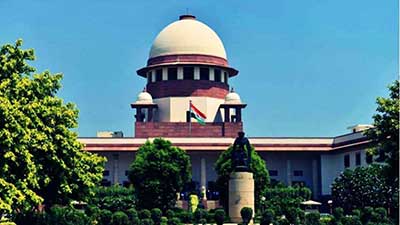Relevance: GS-2: Indian Constitution- historical underpinnings, evolution, features, amendments, significant provisions, and basic structure.
Key Phrases: Article 142, complete justice, criminal jurisprudence, multiple FIRs, Rule of Law, Rule by Law, unconstitutional state of affairs, Delhi Development Authority vs Skipper Construction Company (1996).
Why in News?
- Mohammed Zubair, the co-founder of Alt News, continues to be in prison despite the Supreme Court of India granting him interim bail, because of remand in another case by the Delhi police.
What is Article 142?
- Article 142 provides a unique power to the Supreme Court, to do “complete justice” between the parties, where at times law or statute may not provide a remedy.
- In those situations, the Court can extend itself to put a quietus to a dispute in a manner that would fit the facts of the case.
Challenges before judiciary
- The top court has shown itself to be helpless when issues of individual liberty have been placed before it on very many occasions.
- Many political prisoners languish in prison after their bail pleas have been repeatedly rejected by different courts.
- The executive can register multiple FIRs in the different states of India to ensure that the dissident is not released from prison even if bail is granted in some of the cases.
- Thus, the jail jurisprudence of the executive effectively surpasses the Court’s bail jurisdiction.
- This scenario, which reflects the new normal in the country’s criminal jurisprudence, poses crucial challenges to the judiciary.
More ‘rule by law’:
- The criminal justice system in such tough times degenerates into rule by law, which replaces rule of law.
- The law becomes an effective device in the hands of the Government for a witch-hunt and this operates against the opponents of a regime, as a class.
- In this scenario, if the Court erroneously presumes that the nation’s legal system is governed by the principle of rule of law, fallacies and unjust consequences are bound to occur.
Need for a new doctrine to address structural deficits:
- Even in challenging times, a constitutional court should be able to evolve a mechanism of its own to preserve the democratic foundation of the country by intervening in the incremental process of the nation’s “deconstitutionalisation”.
- At least under certain conditions - of sufficient independence, political support, and remedial power - courts can also play an important role in buttressing democratic processes and commitments, and this is the essence of responsive judicial review.
- The constitutional courts in Colombia and Brazil have
developed the new doctrine of an “unconstitutional state of affairs”.
- This enables the court to address structural deficits with a sense of realism and to pass effective orders even by deviating from procedural rigour, to protect fundamental rights.
- This is, in certain ways, akin to the practice of Public Interest Litigation (PIL) in India and structural injunctions in the United States.
Importance of incorporating Article 142:
- At least in principle, the Indian Supreme Court is constitutionally equipped with the power to invoke its jurisdiction for the larger cause of liberty, even by deviating from the conventional technical route.
- Need for incorporation:
- The genesis of Article 142 shows that the makers of the Constitution have consciously incorporated this provision by drastically modifying the earlier corresponding provision in the Government of India Act, 1935.
- The framers of the Constitution felt that this provision is of utmost significance to those people who have to suffer due to the delay in getting their necessary reliefs due to the disadvantaged position of the judicial system.
- Unlimited powers to the Supreme Court:
- According to some eminent jurists, natural justice is above law, and the Supreme Court will also be above law, in the sense that it shall have full right to pass any order that it considers just.
- Therefore, the Supreme Court shall exercise these powers and will not be deterred from doing justice by the provision of any rule or law, executive practice or executive circular or regulation, etc.
- Varied interpretation of scope:
- The interpretation of the scope of this provision has been varied, and sometimes even conflicting. Some judgments pleaded for its restrictive use while some others did for its liberal and contextual application.
- In Delhi Development Authority vs Skipper Construction Company (1996), the top court said that the power under Article 142 should remain “undefined and uncatalogued so that it remains elastic enough to be moulded to suit the given situation”.
Way forward:
- It is essential for the Supreme Court of India to treat political prisoners and dissenters facing multiple FIRs and undergoing unjustifiably long incarceration as a class.
- It needs jurisprudence at the normative level to tackle the technical arguments that create a false notion of rule of law when the very cause of arrest and detention is the lack of it.
- When a glaring instance of curtailing a person’s freedom is placed before the top court, it should be capable of calling for the records about the multiple FIRs and to suo motu add all the stakeholders as parties (if needed); the Court should immediately ensure that vindictive incarceration does not continue even for a day.
- It is imperative to evolve an effective jurisprudence of “complete justice” by focusing on personal liberty.
- It is the praxis of this new judicial device that can, perhaps, preserve the country’s democratic legacy.
Source: The Hindu
Mains Question:
Q. It is imperative to evolve an effective jurisprudence of “complete justice” by the Supreme Court of India focusing on personal liberty. Critically evaluate.








